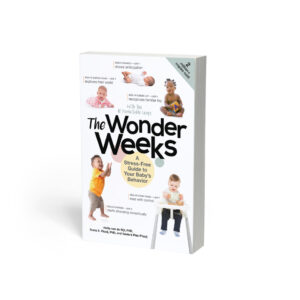The Wonder Weeks: A Stress-Free Guide to Your Baby’s Behavior By Xaviera Plas-Plooij (Book Excerpt)
 Chapter: #Blessed and #Stressed
Chapter: #Blessed and #Stressed
The primary aim of The Wonder Weeks is to reassure you and to give you insight into the mental changes your baby goes through as they grow. It is not easy when your baby takes a leap in their development and it affects your baby, you, and your family. We hope that The Wonder Weeks will help alleviate your doubts and concerns because you will know why your baby is upset during certain periods. We cannot eradicate the stress that accompanies a leap, and we wouldn’t want to, either. Stress is all part of life and parenthood, and it shapes us, making us more alert and more receptive to the changes our baby is going through. And that latter is important. What we can do, however, is offer you a helping hand by reminding you of the importance of taking time for yourself and suggesting ways to do that, with 5-minute, 10-minute, and longer “anchor moments.” These are simple things that you can do, or not do, that anchor you in the here and now. They take you away from the roller coaster of events and emotions and help you regain balance; they provide a moment of calm. When you integrate regular anchor moments in your day, you give your body time to reset itself and to come to rest. Those moments are a great help in reducing stress!
Below, you’ll find a list of simple suggestions…Read a story, go shoot some hoops, paint your nails, whatever you want, as long as you take brief moments of rest that will anchor you and bring you back to the here and now. You really deserve to take and enjoy these moments.
“Tea break”: It may not be tea, but having a drink, such as an herbal tea or other relaxing beverage, makes you sit down and relax. Don’t rush it. Avoid stimulants—such as coffee, ordinary tea (which contains caffeine), energy drinks, and the like—in these “tea breaks.”
Meditation: It’s not for everyone, but even the most down-to-earth among us can find a way to meditate that will suit us. Meditation teaches you how to control feelings of panic, to slow down your heartbeat, and to manage disconcerting emotions. You learn breathing techniques and to focus your thoughts in a way that totally resets your mind. You will instantly feel better and more alert after meditating, even if you only meditate for a few minutes. There are numerous apps that show you how you can integrate meditation into your daily routine.
A less formal exercise is just sitting and staring into space or at something like a plant (and knowing that it is okay to do so). As the joke about an old English farmworker in his own vegetable garden goes, “Sometimes I sits on my wheelbarrow and thinks, and sometimes I just sits.”
Reflection: But you have a lot of wonderful new experiences, and it’s important to savor these and let them sink in, because before you know it, your newborn is a few months old. Each day can bring many amazing and intense feelings, so cherish them. Sit on the couch with your baby, look at them, and think about all the wonderful times you have already spent together. Take a moment to really think about and cherish them.
You might also think about your own body, and what an amazing job it did. Or about the shared joys with your partner that your baby has brought you both.
Mindfulness: You may have heard of mindfulness therapies. These are ways of helping people who are, for instance, anxious. Essentially, they focus on the here and now, such as sitting comfortably just focusing on your own slow breathing or something else that is immediate. Focusing on breathing can be very helpful.
Breathing and “Breath-FS”: We breathe all day long and take it for granted. We rarely take time to focus on our breathing. Make sure your baby is in a safe place first, so you don’t have to keep opening your eyes to check on them. Then sit down quietly, close your eyes, and concentrate on your breathing. Breathe deeply in and out 10 times. Your heartbeat will slow down. Think of nothing but your breathing.
Taking a “breath-FS” has an even greater effect. This exercise is based on the fact that inhaling is similar to putting tension on your body (think about it: you hold your breath when you lift something heavy) and exhaling releases that tension (when you have a fright, you hold your breath; and when you relax, you breathe out again). To release the most tension possible through breathing, say FFFFFF while breathing out. When you have almost completely exhaled, say SSSSS. You will exhale more deeply than you usually do. As you completely exhale, hold it for a moment before breathing in again. Take 10 breaths saying FFFFSSS and you will instantly feel more relaxed than before.
 Excerpted from The Wonder Weeks: A Stress Free Guide to Your Baby’s Behavior. Copyright 2019 Kiddy World Promotions BV – The Netherlands. Reproduced by permission of The Countryman Press. All rights reserved.
Excerpted from The Wonder Weeks: A Stress Free Guide to Your Baby’s Behavior. Copyright 2019 Kiddy World Promotions BV – The Netherlands. Reproduced by permission of The Countryman Press. All rights reserved.
ABOUT THE AUTHOR–
Xaviera Plas-Plooij, mother of three and CEO of the Wonder Weeks, has one mission: to give parents the tools they need in order to fully understand their baby’s mental and emotional development. Daughter of Dr. Frans X. Plooij and Dr. Hetty van de Rijt, founding authors of The Wonder Weeks, Plas-Plooij has significantly revised and modernized the sixth edition of the book. This award-winning book offers a refreshing new paradigm for parenting, one in which fussy phases can be viewed positively. In addition, she launched a bestselling app so parents can track the ten magical leaps that their baby makes, on a personalized schedule. As a writer, columnist, and popular speaker, she’s in 24/7 contact with parents around the globe. Plas-Plooij is a trusted member of the Lumi by Pampers Expert Advisory Panel. She lives with her husband and children in the Netherlands.
Tags: childcare, havivng a family, motherhood, parenting, raising kids, self-care for moms, Wonder Weeks, xaciera plas-plooji















